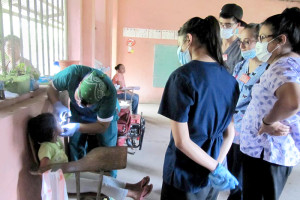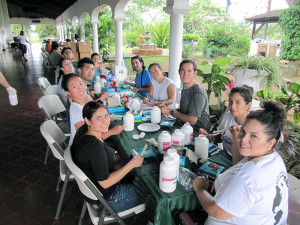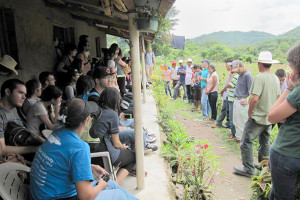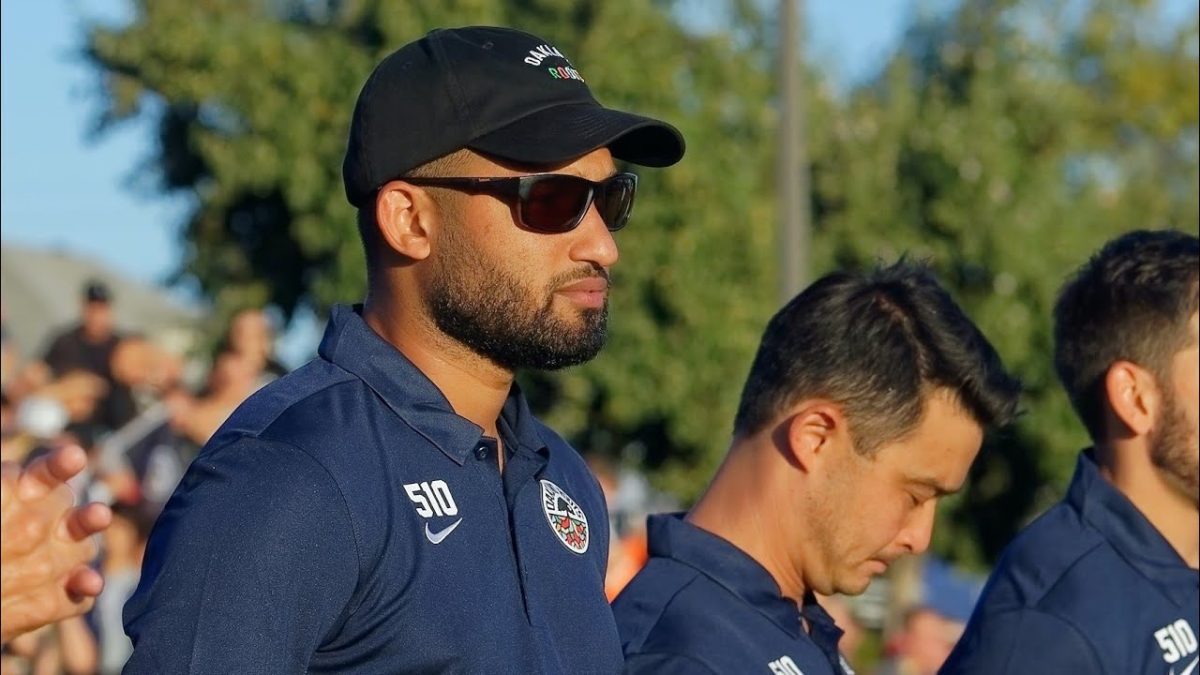
volunteers from CSU East Bay.
Antonio Chavero, a senior at CSU East Bay, tells a story about a man he helped in Honduras this summer. The man he met came to his consultation section of the Global Brigades Institute’s medical unit with a leaf stuck in his ear.
“There is a leaf that grows there, they roll it up and put it in their ear to help prevent and fight ear infections,” Chavero says. “When he got to the triage, his face was swollen and he was in excruciating pain, I got to help him.”
After some days working in the mountains, the man had forgotten about the leaf and it became an infection, a problem that he could not ignore, he says.
Chavero, a health and science major, was one of 45 students from CSUEB who volunteered to go to Honduras this June with the Global Brigades Institute, a nonprofit student-led organization designed to promote health education in developing nations.
“My goal is to get into medical school,” says Chavero, who is the vice president in charge of education and recruitment for the CSUEB chapter. “That’s why this interests me because I’m able to go out there, get some experience, be in the field and do some good.”
The Global Brigades Institute started in 2003 with the goal of facilitating volunteers in rural areas to offer health, economic and educational initiatives to improve the quality of life for people with little or no resources. Unlike the Peace Corps, it is an international network designed only for colleges and universities.
Tiffany Yu, a student in the pre-professional health academic program at CSUEB, started the CSUEB chapter in 2011.
Yu saw the opportunity to start a chapter at CSUEB, so she recruited students and found the board members, Chavero says.
“Originally, it was almost exclusively for the post-bachelor students in the PHAP (Pre-Professional Health Academic Program),” Chavero says, referring to CSUEB’s pre-professional health academic program.
When the CSUEB chapter first launched in 2012, their first trip was to Panama, one of four destinations that the Global Brigades Institute currently supports.
 In addition to Panama, they now have operations in Nicaragua, Honduras and Ghana. The length of each trip ranges from seven to ten days.
In addition to Panama, they now have operations in Nicaragua, Honduras and Ghana. The length of each trip ranges from seven to ten days.
Each college chapter individually decides which location they want to go to, then coordinate with the Global Brigades Institute’s in-country advisors to make arrangements, Chavero says.
The organization conducted research of over 50 rural communities to determine where their unit operations would take place, according to the Global Brigades Institute’s website. These communities are selected based on their specific needs and the amount of support they receive from their community, local officials and their government.
This June, the CSUEB chapter traveled to Santa Cruz, a rural municipality in southern Honduras.
In Santa Cruz, people who develop medical issues, such as infections or work-related injuries, often have to travel over two hours to Tegucigalpa, the capital city, to see a doctor – a trip they typically cannot afford, Chavero says. This experience is common among the other communities they serve.
Many either ignore their ailments or try to treat them with local herbs. In most cases, the residents of these communities do not have money for medicine, he says.

For the man who developed complications after self-treating his ear infection, Chavero was able to treat him, watch the doctor extract the leaf and then prescribe medication that he and his group brought from the U.S.
The CSUEB chapter bring items such as antibiotics, pain relievers, asthma inhalers, eye drops, vitamins, high blood pressure and gastrointestinal medication to the communities they serve.
Additionally, they provided dental supplies and hygiene related items to the unit in Santa Cruz.
Global Brigades Institute’s in-country advisors provided this list, says Justin Lai, a student in the pre-professional health academic program at CSUEB. He is also the former co-vice president of medicine for the CSUEB chapter.
The chapter approaches companies, ranging from small businesses to private individuals, as well as nonprofit organizations and large corporations such as Target and Costco, to ask for item donations that they can use at their medical sites.
This summer, the group was able to treat almost 1,000 patients over a three-day period, says Ted Chung, the current vice president for the chapter who is in charge of finance and fundraising.
“After seeing some of the patients come through and talk about their ailments, I was able to sit in on the doctor consultations, which gave me a little bit of perspective on how doctors diagnosed patients,” Chung says.
The program is available for the general campus community and Chavero says they hope to recruit students from all academic fields, not just health and science.
The cost of the trip is generally $1,500 to $1,700 per student, and the amount can come from donations or a student’s fundraising efforts, Chung says.
For students who are interested in volunteering, there will be a general information session on Nov. 7 at 8 p.m. in CSUEB’s Science Building.

















